(PDF) Strategic Marketing Management : Assignment
Added on 2021-09-27
48 Pages15924 Words149 Views
APPENDIX A: ASSIGNMENT COVER SHEET
ASSIGNMENT COVER SHEET
Surname
First Name/s
Nombulelo
Student Number
Subject
Strategic Marketing Management
Assignment
Number
02
Tutor’s Name
Examination
Venue
N/A
Date Submitted
02/05/2021
Submission (√) First Submission Resubmission
X
Postal Address
Pinetown 3610
E-Mail
Contact Numbers
Course/Intake
January 2021
Declaration: I hereby declare that the assignment submitted is an original piece of work produced by
myself.
Signature Date: 02/05/2021
1
ASSIGNMENT COVER SHEET
Surname
First Name/s
Nombulelo
Student Number
Subject
Strategic Marketing Management
Assignment
Number
02
Tutor’s Name
Examination
Venue
N/A
Date Submitted
02/05/2021
Submission (√) First Submission Resubmission
X
Postal Address
Pinetown 3610
Contact Numbers
Course/Intake
January 2021
Declaration: I hereby declare that the assignment submitted is an original piece of work produced by
myself.
Signature Date: 02/05/2021
1
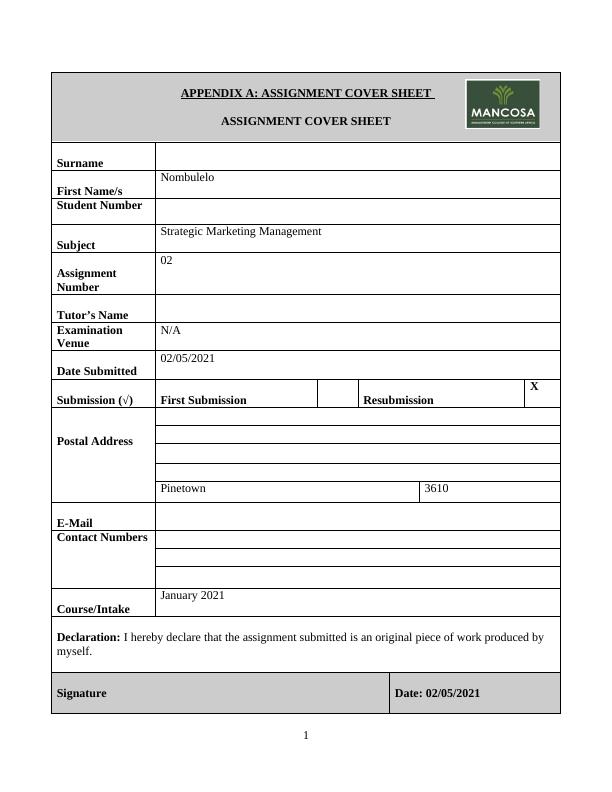
Contents
QUESTION..........................................................................................................................3-3
COMPANY BACKGROUND.............................................................................................4-4
INTRODUCTION................................................................................................................5-7
PROBLEM STATEMENT..................................................................................................8-9
SITUATIONAL ANALYSIS...........................................................................................10-16
IMPACT ON THE BRAND............................................................................................17-19
POSITIONING STRATEGY...........................................................................................20-21
CURRENT SOLUTIONS FOR FINALIZING VOLKSWAGEN SCANDAL...............22-24
PUBLIC RELATIONS CRISIS MANAGEMENT.........................................................25-29
ETHICS............................................................................................................................30-31
RE-BRANDING..............................................................................................................32-32
RECOMMENDATION....................................................................................................33-33
REVISED MARKETING STRATEGY..........................................................................34-43
BIBLIOGRAPHY............................................................................................................44-49
2
QUESTION..........................................................................................................................3-3
COMPANY BACKGROUND.............................................................................................4-4
INTRODUCTION................................................................................................................5-7
PROBLEM STATEMENT..................................................................................................8-9
SITUATIONAL ANALYSIS...........................................................................................10-16
IMPACT ON THE BRAND............................................................................................17-19
POSITIONING STRATEGY...........................................................................................20-21
CURRENT SOLUTIONS FOR FINALIZING VOLKSWAGEN SCANDAL...............22-24
PUBLIC RELATIONS CRISIS MANAGEMENT.........................................................25-29
ETHICS............................................................................................................................30-31
RE-BRANDING..............................................................................................................32-32
RECOMMENDATION....................................................................................................33-33
REVISED MARKETING STRATEGY..........................................................................34-43
BIBLIOGRAPHY............................................................................................................44-49
2
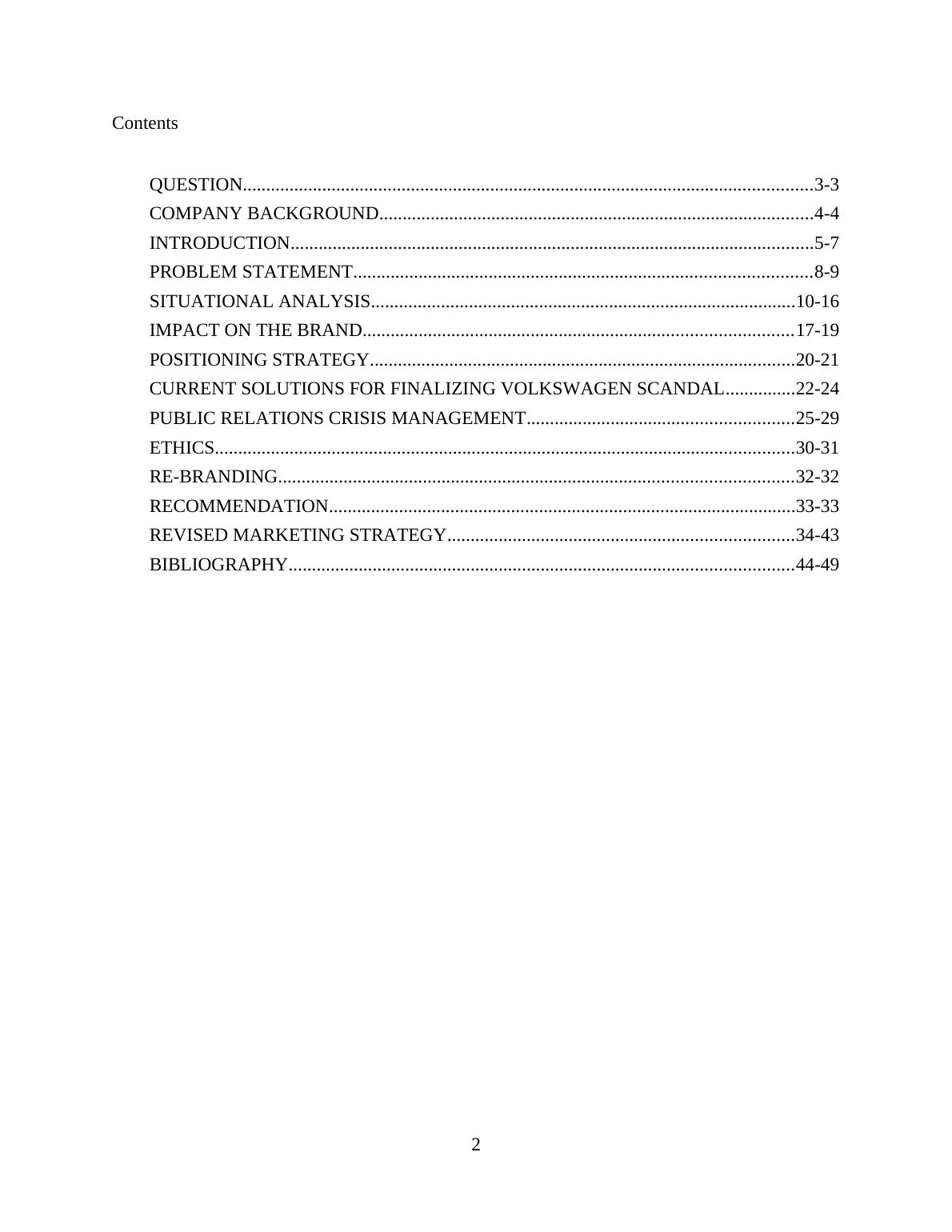
QUESTION
Having been appointed as Marketing Manager of Volkswagen just after the emissions incident
happened, you are required to advise the board on the most appropriate brand crisis
management and provide a revised marketing strategy going forward, to restore confidence in
the brand and prevent any further negative impact on the brand.
3
Having been appointed as Marketing Manager of Volkswagen just after the emissions incident
happened, you are required to advise the board on the most appropriate brand crisis
management and provide a revised marketing strategy going forward, to restore confidence in
the brand and prevent any further negative impact on the brand.
3
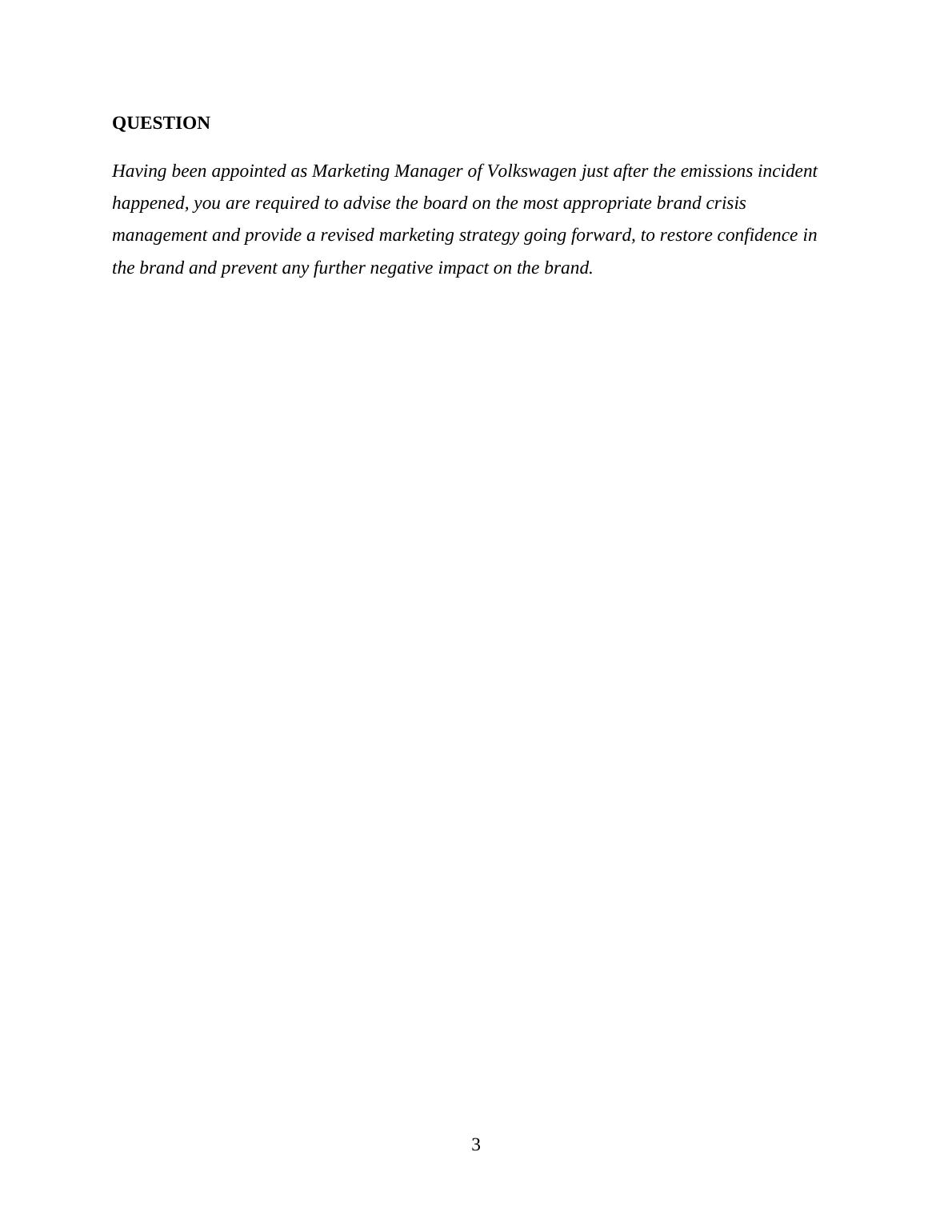
COMPANY BACKGROUND
Volkswagen Group is a German multinational automotive manufacturing company
headquartered in Wolfsburg, Lower Saxony, Germany. Following Toyota, Volkswagen is the
second largest automaker in the world. Over 600,000 employees scattered around the globe
produce over 28,000 vehicles per day in 2016. Volkswagen currently owns 12 subsidiaries which
make up the Volkswagen Group. These include Volkswagen Passenger Cars, Audi, Seat and
Skoda, Bentley, Bugatti, Lamborghini, Porsche, Ducati, and Volkswagen Commercial Vehicles,
Scania and Man T. Bowler (2015). Currently, the global automaker has 120 production plants
spread over 4 continents with the majority of manufacturing operations in Europe and China
Volkswagen AG (2017). Its vehicles are sold in 153 countries T. Bowler (2015). As outlined in
Appendix A, the 12 subsidiaries that make up the Volkswagen Group is composed of an
incredible 347 different models.
Volkswagen (VW) is a large international automobile manufacturer with its world headquarters
located in Wolfsburg, Germany. Volkswagen is owned by the Volkswagen Group - a
multinational corporation that includes other car manufacturers such as Audi, Bentley, Ducati,
Lamborghini, and Porsche McGee (2018). The firm is currently Europe's largest automaker with
a market share of over 20% as of 2010. Worldwide, Volkswagen has ranked as the third-largest
auto manufacturer behind Toyota and General Motors. In 2010, Volkswagen posted record sales
of 6.29 million vehicles, with its global market share at 11.4%.
In September 2015, Volkswagen admitted to United States regulators that it had deliberately
installed "defeat devices" in many of its diesel cars, which enabled the cars to cheat on federal
and state emissions tests, making them able to pass the tests and hit ambitious mileage and
performance targets while emitting up to 40 times more hazardous gases into the atmosphere
than legally allowed. The discovery had prompted the U.S. Environmental Protection Agency
(EPA) to halt the final certification of Volkswagen's 2016 diesel models, and Volkswagen itself
had halted sales of its 2015 models. As the fallout from the defeat devices developed,
Volkswagen posted its first quarterly loss in more than 15 years, and its stock plummeted. Top
executives were replaced, and Volkswagen abandoned its goal of becoming the world's largest
automaker Volkswagen (2016).
4
Volkswagen Group is a German multinational automotive manufacturing company
headquartered in Wolfsburg, Lower Saxony, Germany. Following Toyota, Volkswagen is the
second largest automaker in the world. Over 600,000 employees scattered around the globe
produce over 28,000 vehicles per day in 2016. Volkswagen currently owns 12 subsidiaries which
make up the Volkswagen Group. These include Volkswagen Passenger Cars, Audi, Seat and
Skoda, Bentley, Bugatti, Lamborghini, Porsche, Ducati, and Volkswagen Commercial Vehicles,
Scania and Man T. Bowler (2015). Currently, the global automaker has 120 production plants
spread over 4 continents with the majority of manufacturing operations in Europe and China
Volkswagen AG (2017). Its vehicles are sold in 153 countries T. Bowler (2015). As outlined in
Appendix A, the 12 subsidiaries that make up the Volkswagen Group is composed of an
incredible 347 different models.
Volkswagen (VW) is a large international automobile manufacturer with its world headquarters
located in Wolfsburg, Germany. Volkswagen is owned by the Volkswagen Group - a
multinational corporation that includes other car manufacturers such as Audi, Bentley, Ducati,
Lamborghini, and Porsche McGee (2018). The firm is currently Europe's largest automaker with
a market share of over 20% as of 2010. Worldwide, Volkswagen has ranked as the third-largest
auto manufacturer behind Toyota and General Motors. In 2010, Volkswagen posted record sales
of 6.29 million vehicles, with its global market share at 11.4%.
In September 2015, Volkswagen admitted to United States regulators that it had deliberately
installed "defeat devices" in many of its diesel cars, which enabled the cars to cheat on federal
and state emissions tests, making them able to pass the tests and hit ambitious mileage and
performance targets while emitting up to 40 times more hazardous gases into the atmosphere
than legally allowed. The discovery had prompted the U.S. Environmental Protection Agency
(EPA) to halt the final certification of Volkswagen's 2016 diesel models, and Volkswagen itself
had halted sales of its 2015 models. As the fallout from the defeat devices developed,
Volkswagen posted its first quarterly loss in more than 15 years, and its stock plummeted. Top
executives were replaced, and Volkswagen abandoned its goal of becoming the world's largest
automaker Volkswagen (2016).
4
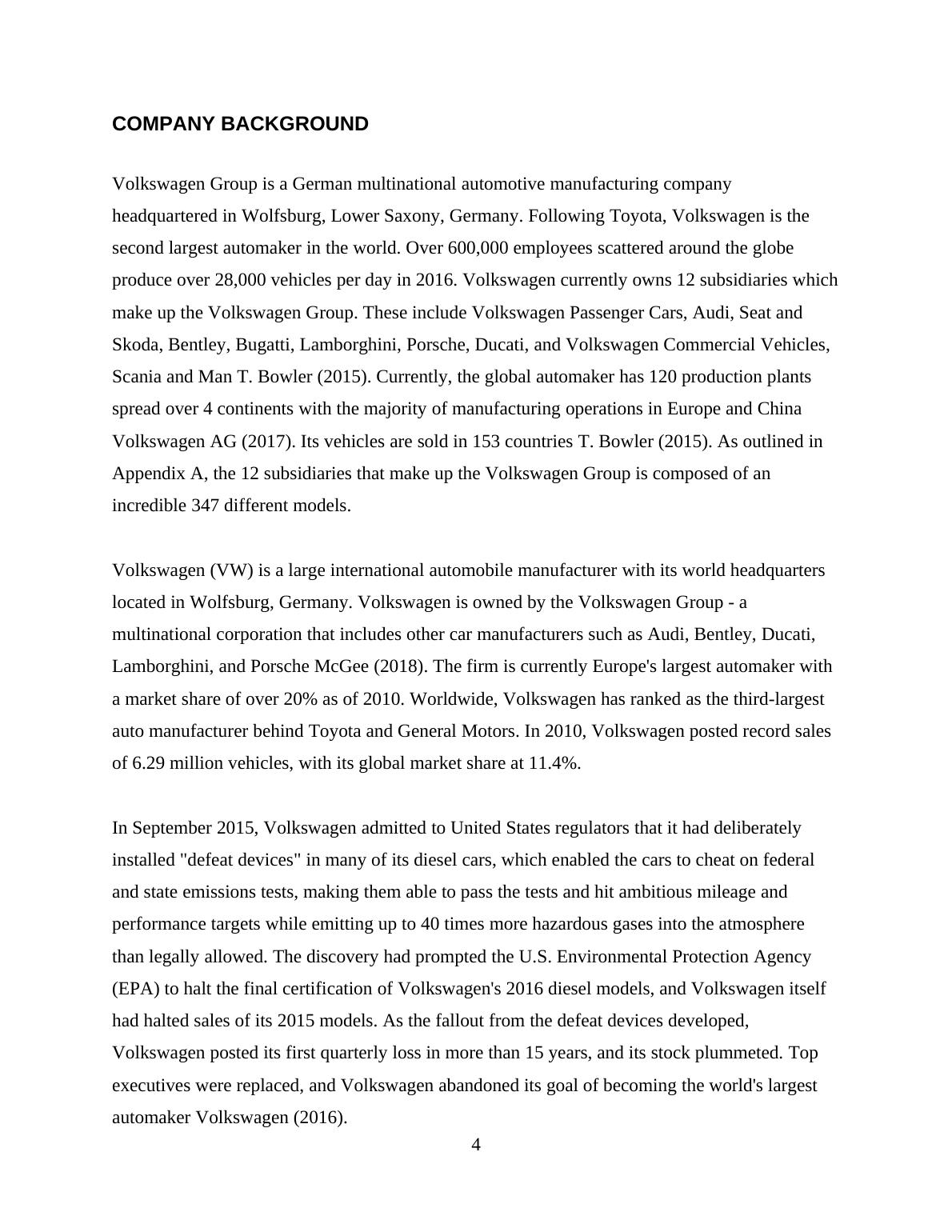
INTRODUCTION
The Volkswagen emissions scandal, also known as Dieselgate or Emissionsgate, began in
September 2015, when the United States Environmental Protection Agency (EPA) issued a
notice of violation of the Clean Air Act to German automaker Volkswagen Group. The agency
had found that Volkswagen had intentionally programmed turbocharged direct injection (TDI)
diesel engines to activate their emissions controls only during laboratory emissions testing,
which caused the vehicles' NO output to meet US standards during regulatory testing, while they
emitted up to 40 times more NO in real-world driving. Volkswagen deployed this software in
about 11 million cars worldwide, including 500,000 in the United States, in model years 2009
through 2015.
Executive Summary
To evaluate the strategy and performance of Volkswagen, the world’s second largest automaker,
internal resources and capabilities, industry environment, and institutional environment of the
company were evaluated. From these analyses, critical issues, threats, and challenges were
identified. Namely, the 2015 emissions scandal, company culture, quality and productivity, and a
new electric car strategy were identified as the primary issues which Volkswagen needs to
proactively address. Four recommendations were developed to not only address these issues but
increase the automaker’s competitive advantage as well M. Hanno, R. Magadia, A. Kadoo & D.
Akinsaya (2019).
This report examines the corporate governance practices of the German automotive
multinational, Volkswagen AG, in relation to the revelation of the diesel-engine emissions
scandal by the U.S Environmental Protection Agency (EPA) in 2015. The Analysis focuses on
how a monetary mindset and negligence towards other elements of 3P’s (People, Planet, and
Profit), that are embedded in corporate structure, ownership composition, Supervisory Board
(SB) and Corporate culture leads to decisions that serve the interest of power-hungry
shareholders at the expense of other stakeholders. The finding reveals power imbalance and
abuse-of-power from dominant shareholders; Porsche-Piëch family, the intrusion of Lower
Saxony (German Government) to ensure national employment, risk of labor inclusion on SB
under the Co-Determination Act and company culture focusing only on profit led to unethical
5
The Volkswagen emissions scandal, also known as Dieselgate or Emissionsgate, began in
September 2015, when the United States Environmental Protection Agency (EPA) issued a
notice of violation of the Clean Air Act to German automaker Volkswagen Group. The agency
had found that Volkswagen had intentionally programmed turbocharged direct injection (TDI)
diesel engines to activate their emissions controls only during laboratory emissions testing,
which caused the vehicles' NO output to meet US standards during regulatory testing, while they
emitted up to 40 times more NO in real-world driving. Volkswagen deployed this software in
about 11 million cars worldwide, including 500,000 in the United States, in model years 2009
through 2015.
Executive Summary
To evaluate the strategy and performance of Volkswagen, the world’s second largest automaker,
internal resources and capabilities, industry environment, and institutional environment of the
company were evaluated. From these analyses, critical issues, threats, and challenges were
identified. Namely, the 2015 emissions scandal, company culture, quality and productivity, and a
new electric car strategy were identified as the primary issues which Volkswagen needs to
proactively address. Four recommendations were developed to not only address these issues but
increase the automaker’s competitive advantage as well M. Hanno, R. Magadia, A. Kadoo & D.
Akinsaya (2019).
This report examines the corporate governance practices of the German automotive
multinational, Volkswagen AG, in relation to the revelation of the diesel-engine emissions
scandal by the U.S Environmental Protection Agency (EPA) in 2015. The Analysis focuses on
how a monetary mindset and negligence towards other elements of 3P’s (People, Planet, and
Profit), that are embedded in corporate structure, ownership composition, Supervisory Board
(SB) and Corporate culture leads to decisions that serve the interest of power-hungry
shareholders at the expense of other stakeholders. The finding reveals power imbalance and
abuse-of-power from dominant shareholders; Porsche-Piëch family, the intrusion of Lower
Saxony (German Government) to ensure national employment, risk of labor inclusion on SB
under the Co-Determination Act and company culture focusing only on profit led to unethical
5
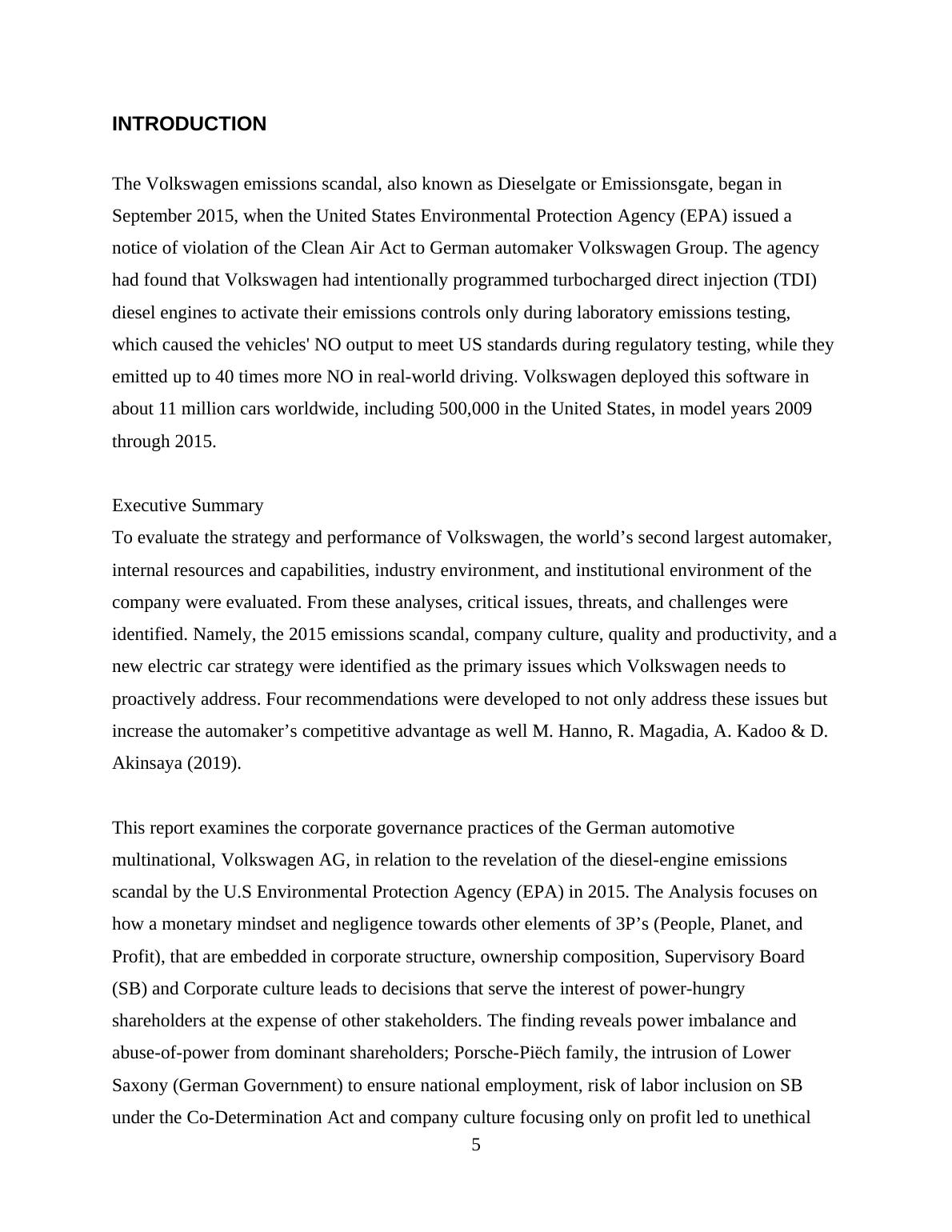
conduct of ‘implanting cheating device’, hence displaying the firm’s poor Corporate Governance
procedures L.J. Lynch; C. Cutro; E. Bird (2016).
Furthermore, analytical research has been done using two prominent theories in this field –
Agency Theory and Stakeholder Theory. Using Agency Theory, it is found that the presence of
the controlling shareholder in Volkswagen induces principal-principal problem by exploiting
opportunities catered to their interest at minority shareholders’ cost. In addition, Germany’s two-
tier board system that ideally separates job is not effective for Volkswagen due to the dominance
and abuse of power from major Shareholders regarding controlling the direction of management
activity L.J. Lynch; C. Cutro; E. Bird (2016).
On the other hand, Principal-Agent Problem also exists due to the presence of Government as the
second-largest shareholder of the firm ever since World War II. This intrusion is negative to
Volkswagen due to conflict of interest between Government and Shareholders – focus on welfare
or increase shareholder returns. Furthermore, the inclusion of labor representatives in SB is also
risky due to the possibility of these representatives exercising decisions based on their personal
interest, maintaining their job. In view of Stakeholder Theory, it is found that Volkswagen’s
intention to save profits by carrying out activities that are unethical backfired, causing the firm to
incur a massive loss and damage its brand image. Therefore, the company’s long-term
sustainability can only be achieved if the company aligns its profit intentions with ethical
intentions of serving People and Planet. To improve good corporate governance practice in
Volkswagen, this report provides various recommendations to modify internal governance
procedures L.J. Lynch; C. Cutro; E. Bird (2016).
Firstly, setting a contract that specifies clear expectations and roles. Following this, the firm will
benefit greatly by having regular evaluations and instilling a whistle-blower protection system
managed by the third partyL.J. Lynch; C. Cutro; E. Bird (2016).
Secondly, to increase performance, reformation on the structure of SB needs to be conducted by
having more independent members, professional-hired as a government representative, and
allowing other representatives on the nominee committee to limit majority shareholders’ power
L.J. Lynch; C. Cutro; E. Bird (2016).
6
procedures L.J. Lynch; C. Cutro; E. Bird (2016).
Furthermore, analytical research has been done using two prominent theories in this field –
Agency Theory and Stakeholder Theory. Using Agency Theory, it is found that the presence of
the controlling shareholder in Volkswagen induces principal-principal problem by exploiting
opportunities catered to their interest at minority shareholders’ cost. In addition, Germany’s two-
tier board system that ideally separates job is not effective for Volkswagen due to the dominance
and abuse of power from major Shareholders regarding controlling the direction of management
activity L.J. Lynch; C. Cutro; E. Bird (2016).
On the other hand, Principal-Agent Problem also exists due to the presence of Government as the
second-largest shareholder of the firm ever since World War II. This intrusion is negative to
Volkswagen due to conflict of interest between Government and Shareholders – focus on welfare
or increase shareholder returns. Furthermore, the inclusion of labor representatives in SB is also
risky due to the possibility of these representatives exercising decisions based on their personal
interest, maintaining their job. In view of Stakeholder Theory, it is found that Volkswagen’s
intention to save profits by carrying out activities that are unethical backfired, causing the firm to
incur a massive loss and damage its brand image. Therefore, the company’s long-term
sustainability can only be achieved if the company aligns its profit intentions with ethical
intentions of serving People and Planet. To improve good corporate governance practice in
Volkswagen, this report provides various recommendations to modify internal governance
procedures L.J. Lynch; C. Cutro; E. Bird (2016).
Firstly, setting a contract that specifies clear expectations and roles. Following this, the firm will
benefit greatly by having regular evaluations and instilling a whistle-blower protection system
managed by the third partyL.J. Lynch; C. Cutro; E. Bird (2016).
Secondly, to increase performance, reformation on the structure of SB needs to be conducted by
having more independent members, professional-hired as a government representative, and
allowing other representatives on the nominee committee to limit majority shareholders’ power
L.J. Lynch; C. Cutro; E. Bird (2016).
6
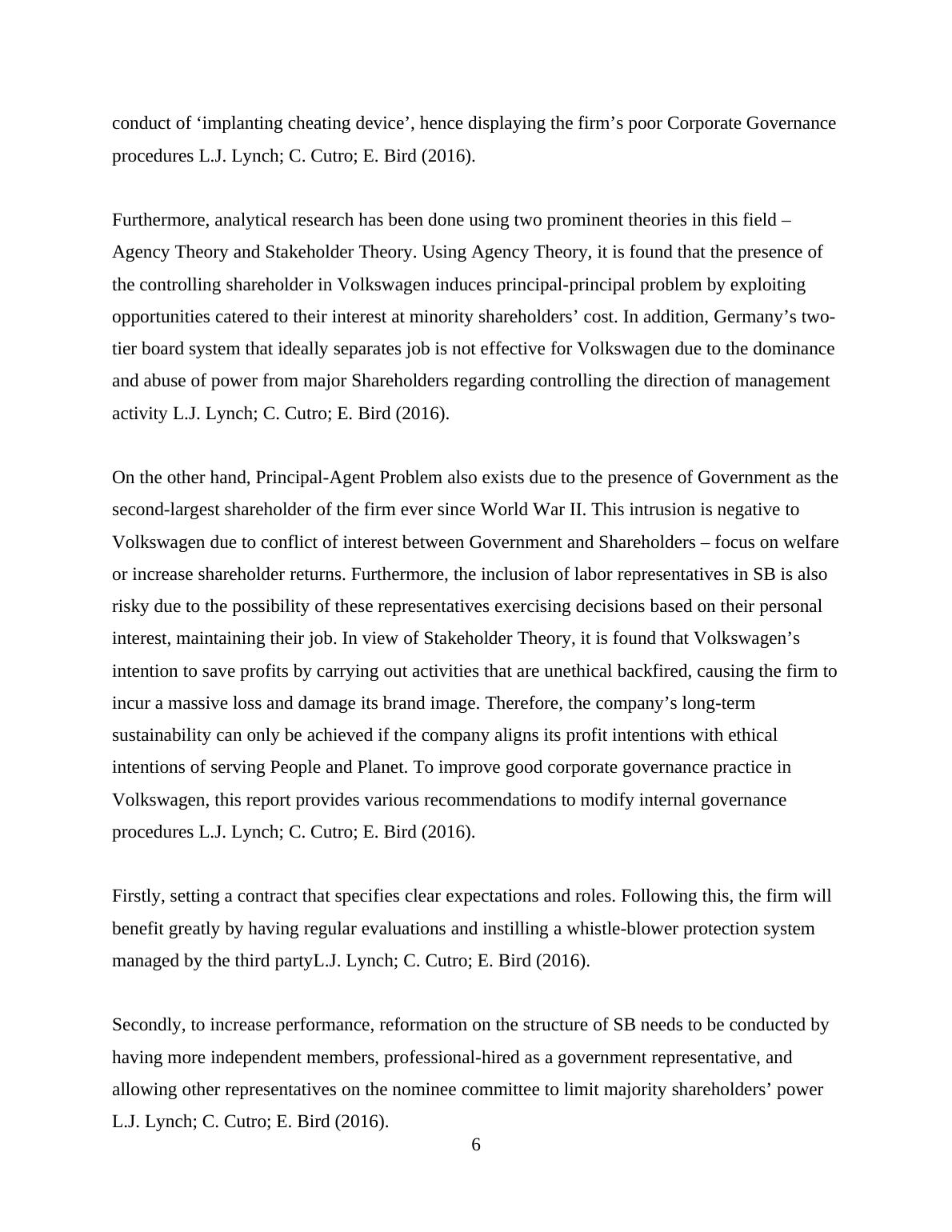
Lastly, to restore its brand image and gain stakeholders’ trust, Volkswagen must rebrand and
plan on fulfilling corporate social initiatives that will gear the firm into strategic success and
sustainability in the long run L.J. Lynch; C. Cutro; E. Bird (2016).
7
plan on fulfilling corporate social initiatives that will gear the firm into strategic success and
sustainability in the long run L.J. Lynch; C. Cutro; E. Bird (2016).
7
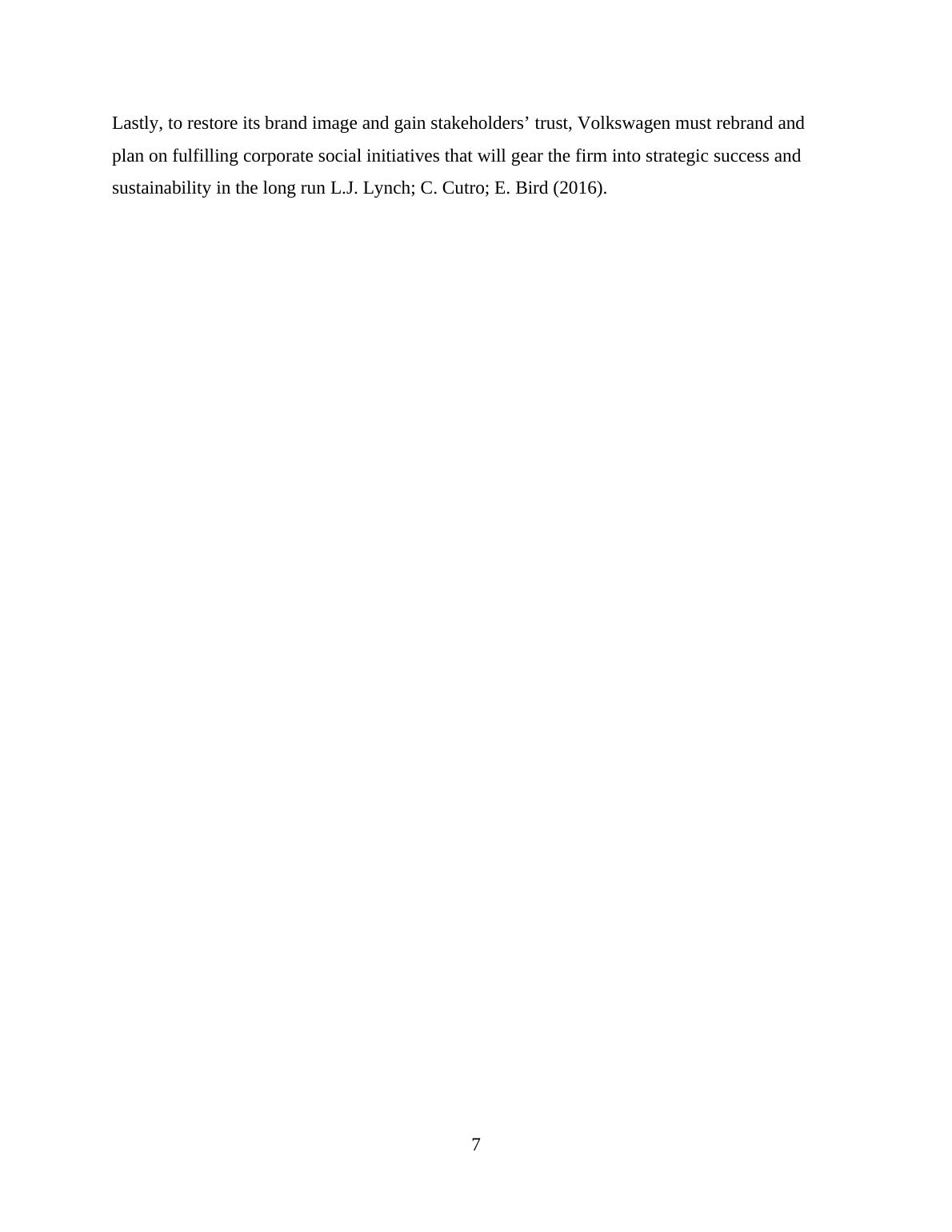
PROBLEM STATEMENT
The purpose of this research report is, firstly, to analyze the reasons that triggered the state of the
brand crisis and then look at the strategies to manage the brand in 6 particular the typical
components of a marketing strategy that can be useful for the mitigate the problem.
The report will interrogate every possible solution through situational analysis and then employ
every suited strategy to perform the brand impact diagnostic, while more emphasis will be put on
brand positioning for customer confidence purposes. From this report, the revised plan will be
produced to the board for them to be able to deal with other future similar crises related to the
brand.
On 18 September 2015, the US Environmental Protection Agency (EPA) informed the public
about Volkswagen’s and Audi’s violation of the Clean Air Act by installing “defeat devices” that
allow their cars to pass all tests but then emit nitrogen dioxide at up to 40 times the permitted
level. The Volkswagen engineers had initially admitted to the EPA on September 3 that defeat
devices had been fitted to 480,000 diesel cars in the US – but the news only reached the wider
world on 18 September when the regulator, not Volkswagen, disclosed the issue M. Wang, J.
Fitzpatrick (2019).
In 2015, the world became aware that Volkswagen had installed “defeat devices” in 500,000 of
its American diesel cars, enabling them to pass America’s strict emission standards and then
return to non-compliant emissions during normal driving. It has been several years since the
initial news broke, but the repercussions from this scandal are ever evolving, from the many
fines and lawsuits that Volkswagen will have to contend with, to the arresting of Volkswagen
Group executives over their involvement. There is urgent need to work on Communication
Strategies with media resources and to address the nation effectively M. Wang, J. Fitzpatrick
(2019).
On 2 November, the EPA said it had uncovered another defeat device in the VW Group’s other
cars, namely in Audi, Porsche, and VW 3-litre diesel cars, which affects a further 85,000
8
The purpose of this research report is, firstly, to analyze the reasons that triggered the state of the
brand crisis and then look at the strategies to manage the brand in 6 particular the typical
components of a marketing strategy that can be useful for the mitigate the problem.
The report will interrogate every possible solution through situational analysis and then employ
every suited strategy to perform the brand impact diagnostic, while more emphasis will be put on
brand positioning for customer confidence purposes. From this report, the revised plan will be
produced to the board for them to be able to deal with other future similar crises related to the
brand.
On 18 September 2015, the US Environmental Protection Agency (EPA) informed the public
about Volkswagen’s and Audi’s violation of the Clean Air Act by installing “defeat devices” that
allow their cars to pass all tests but then emit nitrogen dioxide at up to 40 times the permitted
level. The Volkswagen engineers had initially admitted to the EPA on September 3 that defeat
devices had been fitted to 480,000 diesel cars in the US – but the news only reached the wider
world on 18 September when the regulator, not Volkswagen, disclosed the issue M. Wang, J.
Fitzpatrick (2019).
In 2015, the world became aware that Volkswagen had installed “defeat devices” in 500,000 of
its American diesel cars, enabling them to pass America’s strict emission standards and then
return to non-compliant emissions during normal driving. It has been several years since the
initial news broke, but the repercussions from this scandal are ever evolving, from the many
fines and lawsuits that Volkswagen will have to contend with, to the arresting of Volkswagen
Group executives over their involvement. There is urgent need to work on Communication
Strategies with media resources and to address the nation effectively M. Wang, J. Fitzpatrick
(2019).
On 2 November, the EPA said it had uncovered another defeat device in the VW Group’s other
cars, namely in Audi, Porsche, and VW 3-litre diesel cars, which affects a further 85,000
8
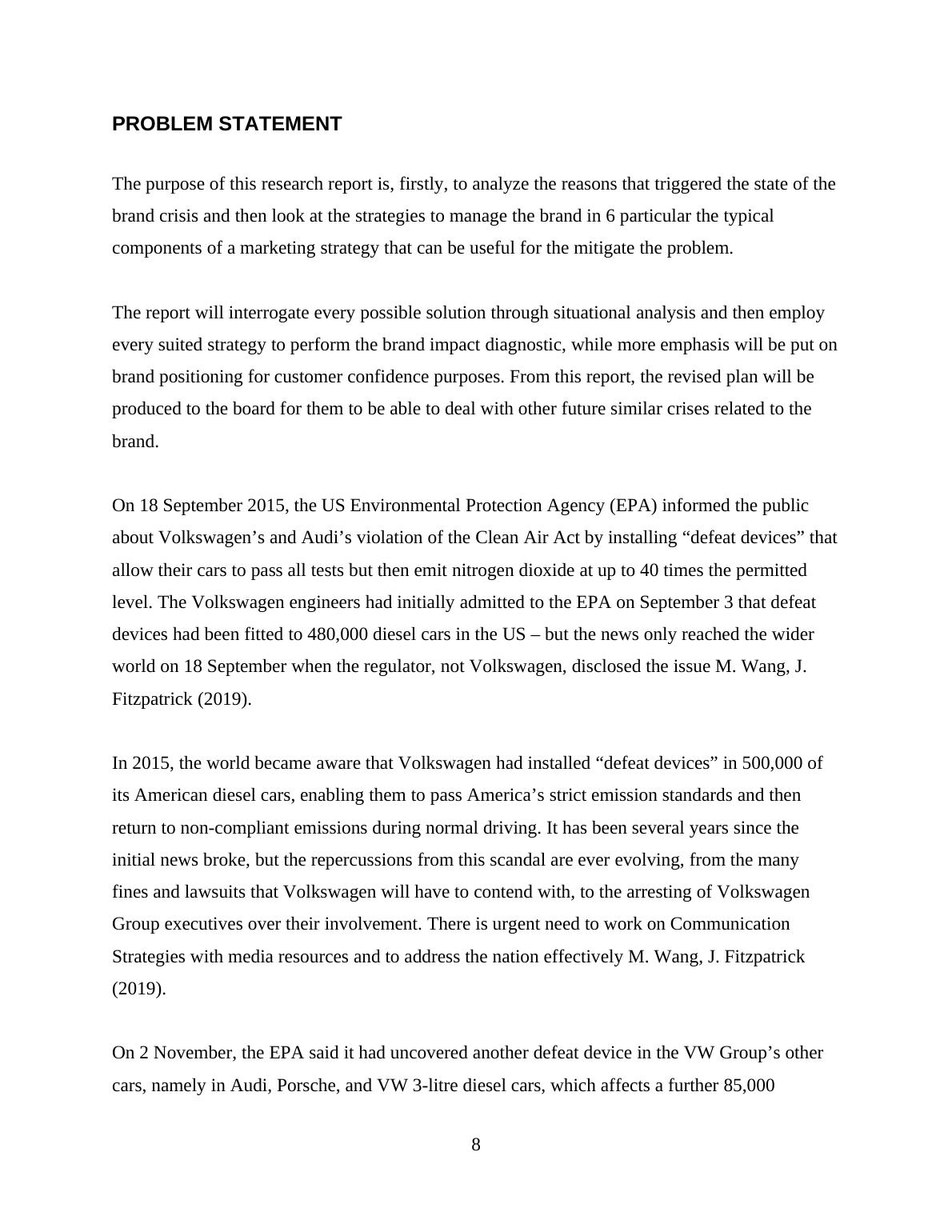
End of preview
Want to access all the pages? Upload your documents or become a member.
Related Documents
Volkswagen Group vs Toyota Motor Corporation: Ethics and Organisationslg...
|14
|3220
|393
Volkswagen Emission Scandal: An Analysis of Ethical Issues and Dilemmaslg...
|7
|1476
|367
Volkswagen: Strategies and Change Managementlg...
|12
|2711
|272
Individual Report of Context of Businesslg...
|9
|2568
|151
Case Study Analysis: Volkswagenlg...
|11
|3418
|69
Managerial Accounting Assignment | Volkswagen Grouplg...
|12
|2658
|223